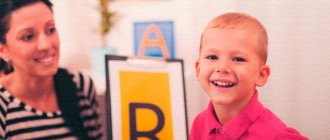Educational program for parents
Articulation gymnastics for children 3-18 months Children with speech disorders
Dysgraphia
- mechanism and forms of dysgraphia, advice to parents, exercises to help overcome dysgraphia
How to Help Your Child Remember to Spell Dictionary Words
Dyslexia
- forms and causes of dyslexia, basic techniques and methods of working with dyslexic children, texts of visual dictations, tests to determine dyslexia for adults.
Dysarthria (detail)
- causes of dysarthria, main directions of correctional work, exercises, techniques, where to go for help
Dysarthria, erased form of dysarthria (briefly)
Hyperactivity and disinhibition
Alalia, ONR, ZRR, MDD
Stuttering
- causes and symptoms of stuttering, methods of overcoming stuttering, rules and exercises, practical advice, where to go for help
Mutism
- a little history, clinical variants of mutism, treatment of mutism, recommendations on where to go for help
Rhinolalia
- forms of rhinolalia, elimination of rhinolalia, gymnastics, exercises, where to go for help
Bradylalia
- symptoms, methods of speech therapy, recommended exercises, where to go for help
How are Caesar babies different from naturally born children?
How to get rid of interdental sounds?
Dear parents , you, of course, know that a child is not born with developed speech. Speech is formed gradually. Step by step, the baby learns to speak: first, pronounce individual sounds and simple words, then connect these words with each other, build sentences of varying complexity, and only then express his thoughts clearly and consistently.
Let's consider the stages of normal speech development of a child :
— By the age of 1.5-2 years, simple sentences consisting of two or three words should appear in the baby’s speech. in the child’s : “good”, “bad”, “big”, “small”. Don’t be upset if they sound like “hayoshi, pahoi, bashoi, maikii.”
— By the age of 3, the so-called physiological softening disappears the child’s The child correctly reproduces vowels and all simple consonant sounds ([b], [b'], [p], [p'], [m], [m'], [t], [t'], [n], [n'], [k], [k'], [g], [g'],
[v], [v'], [f], [f'], builds simple common or even
complex sentences with a lot of grammatical errors. He easily remembers and recites short rhymes.
— By the age of 4, the child should correctly pronounce the whistling sounds [s], [s'], [z], [z'], and use complex sentences in speech. He happily talks about what he saw on a walk or on TV, what was read to him. Do not insist that your child pronounce the sound [r] correctly at this age.
Very often, the desire of mom and dad to teach the child to master a complex sound and the inability to do this leads to a serious violation of sound pronunciation.
— By the age of 5, the child should correctly pronounce the hissing sounds [w], [zh], almost avoid grammatical errors in speech, and should coherently talk about what is depicted in a series of pictures or in one picture.
— At the age of 6, a normally developing child correctly pronounces all the sounds of his native language, practically does not make grammatical errors in his speech, and is proficient in all forms of oral speech: dialogical, monologue, contextual and situational.
Recently, the number of preschoolers with
speech problems . There are more and more children with severe speech disorders . And parents turn to a speech therapist after 5 years . However, with severe speech impairments, by this age much is lost, and it is necessary to correct already incorrect language use. Which will require a lot of effort to catch up. Since the period of early childhood is decisive for the development of speech.
Why is this happening? Almost all parents monitor the physical development of their children . The same cannot be said about speech development . Each child is individual , including in terms of speech development .
There are certain dates for the appearance of speech (discussed above). If a child has a delay in speech development , this should serve as a “bell” for parents . It is necessary to carefully monitor further speech development and seek advice from specialists.
After all, everyone knows that the general psychological development and development speech development : memory, thinking, imagination, attention of the child , the formation of the sphere of interpersonal interaction.
Correct, beautiful, coherent speech is the key to a child’s successful education at school , mastering not only his native, but also foreign languages.
parents will provide the highest quality assistance to their children :
who will try to comply with the following rules:
— From the first days of life, a child should be surrounded by a full-fledged speech environment .
— Try to accompany your daily activities
use correct speech, name your actions, household items
everyday life, while more often giving the baby the opportunity to see your face and observe your articulation.
- Encourage any attempts child makes to speak : your baby will speak only when you want to listen to him.
- Speak to the child slowly , in short and accessible phrases, do not switch to “children’s language”, do not allow “ profanity ”.
- Spend more time with your child ; Be close to your baby more often, within his reach, pick him up: physical contact is vital.
- Read to your baby every day; Do not under any circumstances show your annoyance or reluctance if a child asks you to read; Not
get annoyed if you have to read the same book many times that the child especially loved ; Be glad that he is already a book lover and has his own passions.
- Do not correct the child’s , just repeat the same phrase correctly.
- Encourage curiosity, the desire to ask questions, to do this, answer every child’s question.
- Do not compare your baby with other children.
- Remember, nothing happens by itself! Provide your child with the necessary conditions for successful development .
Many researchers over the years have repeatedly emphasized: there is no need to wait for the child’s speech development - it is necessary to provide him with comprehensive assistance until this process is completed, thus helping to prevent possible speech disorders . Timely and complete formation of speech in preschool childhood is one of the main conditions for the normal development of a child .
The sooner parents pay attention to the child's , the faster it is formed and normalized .
Modern parents begin to worry about speech problems when their child 2.5–3 years of age. Watch your baby. You should be concerned if your child :
· very lethargic, reluctantly reacts to his surroundings;
· often shows anxiety, sways the body from side to side;
· has a strong flow of saliva;
· does not follow simple verbal commands (go to the kitchen and bring a cup, etc.);
· does not play with other children or feed the doll from a plate, but puts the doll on a plate, etc.;
· says “ma” instead of “mama” or refers the word “mama” to other persons; instead of “girl” he says “de”; “bunny” - “for”; “go” - “di”; “look” - “api”;
· uses fragment words, i.e. those in which only parts of the word are preserved: “ako” - milk, “deka” - girl.
All this is a serious reason to immediately seek advice from a specialist - a speech therapist .
It is a mistake to hope for spontaneous disappearance of pronunciation deficiencies as the child , since they can become firmly entrenched and turn into a permanent violation.
Dear fathers and mothers!
Speech therapy examinations carried out annually in kindergarten show that the state of speech of middle-aged children (4-5 years old) often does not correspond to the age norm , but by the age of four all sounds should already be fully formed and used correctly in speech. We will not dwell on the reasons for the trouble.
We will try to highlight those preventive measures that parents who want to hear their children’s clear speech should take.
So:
Every year, starting from the first year of a child’s , undergo an examination by a speech therapist at a children’s clinic;
be critical of the speech manifestations of children , starting from birth, and in cases of any deviations from the norm, contact a speech therapist , without reassuring yourself with the belief that everything will work itself out;
Be sure to consult your child with an ENT doctor about the presence of adenoids, since adenoids significantly affect speech, and with an orthodontist. If a child is indicated for adenotomy or bite correction, then do not delay in solving these problems;
Most children suffering from sound pronunciation disorders have impairments in phonemic hearing, with the help of which we distinguish sounds that are similar in sound or articulation. The speech therapist you contact will teach you how to develop phonemic awareness ;
Attend speech therapy classes with your child , doing homework carefully. Without completing these tasks, without constant monitoring of the assigned sounds, it will be impossible to achieve positive results;
in case of severe speech disorders, do everything to ensure that the child gets into a speech therapy group in a timely manner . Do not put off resolving this issue year after year by listening to the advice of incompetent people.
6 years is the age when a child should go to school . At school, the child will have to be independent, so in the remaining time before school, the child must be prepared for school .
From time to time, talk to your child about school , setting him up for a serious and responsible attitude, but do not intimidate him with school, but, on the contrary, arouse interest in learning.
The child must have developed speech readiness , i.e. the ability to:
correctly pronounce all sounds of the language;
highlight the first and last sound in a word;
divide a word into syllables;
determine how many syllables are in a word , how many sounds are in a word;
come up with words for a given sound;
merge the two named sounds in a syllable: M+A=MA;
repeat syllable chain like TA-DA-TA;
determine the number of words in a sentence, taking into account “short” words - prepositions.
It is important to find out:
how rich is the baby’s vocabulary, can he coherently talk about what he saw and heard;
How developed is the child’s horizons , does he know his last name, first name, patronymic, age;
what he knows about the world around him, can he name the days of the week, seasons of the year;
whether he has formed generalization words; Is he oriented in time? knows how to exclude “extra” from the proposed series;
Can he arrange the plot pictures in order and compose a story based on them?
Do more drawing with your child . Check if your child can draw a person , i.e. a figure with details of the face, clothing, and clearly drawn limbs. This skill indicates how developed the hand is . Invite your child to “copy” a phrase like “He ate soup” that you clearly wrote in cursive.
Repeat numbers from 1 to 9 and counting within 20 - quantitative and ordinal.
the poems you have learned with your child from time to time .
Always take an interest in the child's life in kindergarten .
In case of any difficulties, contact a speech therapist or teacher .
Speech development of children 4-7 years old
Speech therapy homework on the formation of the lexical and grammatical structure of speech and the development of coherent speech
Preface
SEPTEMBER
- Week 1 Vegetables
- Week 2 Fruits
- 3rd week Garden
- Week 4 Where did the bread come from?
OCTOBER
- 1st week Trees
- Week 2 Mushrooms
- 3rd and 4th week Autumn
NOVEMBER
- 1st and 2nd week Wild animals of our forests and preparing them for winter
- 3rd and 4th week Pets
DECEMBER
- 1st and 2nd week Poultry
- 3rd and 4th week New Year. Christmas decorations
JANUARY
- 1st week Christmas
- Week 2 Winter fun
- Week 3 Wintering birds
- 4th week Winter (summary)
FEBRUARY
- 1st week Dishes
- 2nd week Transport. Traffic rules
- 3rd week Defender of the Fatherland Day
- Week 4 My family
MARCH
- 1st week March 8th - mother's holiday
- 2nd week Professions
- 3rd and 4th week Migratory birds
APRIL
- 1st week Early spring
- 2nd week Cosmonautics Day
- 3rd week Easter
- Week 4 Furniture
MAY
- 1st week Repetition
- 2nd week Victory Day
- 3rd week Spring. Primroses
- Week 4 Insects
JUNE
- 1st week Spring (recap)
2nd week Summer homework
See also: Themed walks






